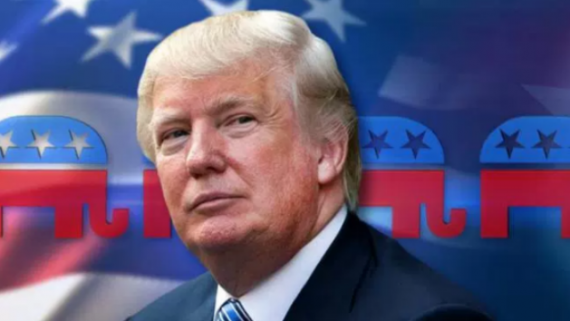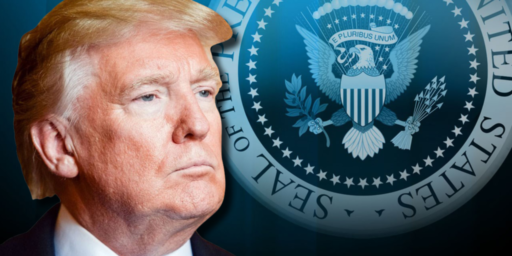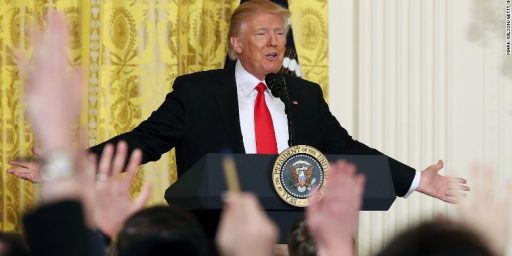Republican Candidates Stuck With The Donald Trump Albatross Around Their Necks
Whether they like it or not, Republican candidates in the midterms will have to run with the albatross of Donald Trump around their necks.
Republicans running for the U.S. Senate this year are finding that distancing themselves from Donald Trump generally isn’t an option:
Among his qualifications for the U.S. Senate, Rep. Evan Jenkins wants West Virginia voters to know that he once attended a Christmas party with Donald Trump, flew with him on Air Force One and watched two movies in the president’s private theater at the White House.
“He sat there right from beginning to end,” Jenkins (R) said of the screenings of “12 Strong,” a military thriller, and “The 15:17 to Paris,” the recent Clint Eastwood flick. “I have a great working relationship with him.”
Mitt Romney (R), a Senate candidate in Utah who called Trump a “phony, a fraud” during the presidential election campaign, recently embraced the president’s confrontational moves on trade and insisted he was tougher on immigration than Trump. And in Nevada, another Republican and former Trump foe, Sen. Dean Heller, has been praising the president’s policies in private meetings, while publicly saying that their relationship has “grown.”
Such flattery matters in GOP Senate primaries these days, even as Republicans in Washington express increasing unease with the president’s contradictory and pugilistic style of governance.
In intraparty fights across the country, fealty to Trump has become the coin of the realm. Candidates who once distanced themselves from him now declare themselves acolytes, attack rivals for any deviation from the Trumpian script and, in one case, even don his cherry-red campaign cap in ads.
“I’ll proudly stand with our president and Mike Pence to drain the swamp,” a hat-wearing Rep. Todd Rokita (R-Ind.) says in a recent ad, which started airing days before the Associated Press republished a 2016 interview in which he called Trump “vulgar, if not profane.” Rokita is seeking the nomination to run against Sen. Joe Donnelly (D).
At the root of the fawning rapprochements are two defining features of the Senate landscape: Trump enjoys enormous popularity among Republican primary voters, and most of the contested races are in states Trump won in 2016.
“I haven’t seen a state where among Republicans his favorables are anything less than 80 percent,” said Jim McLaughlin, a Republican pollster who has polled for Trump. “The challenge is going to be for the Republicans, whether it’s the congressional races or the Senate races, to get the bases motivated.”
That candidates for the Republican nomination in states where Trump remains popular among Republicans are remaining largely loyal to the President, or at the very least muting or seeking to move past their previous criticism of the President as Romney seems to be doing, is hardly surprising. As McLaughlin notes above, for better or worse the fact of the matter is that the President remains hugely popular among Republicans, especially in states that are historically Republican, and a candidate who seeks to distance himself from a President who is that popular with the base is going to open themselves up to challenges from the right, not to mention the potential of direct attacks from the President himself. Further evidence of the President’s popularity among Republicans can be found in the national job approval poll, which shows that more than 80% of self-identified Republicans nationwide approve of the job President is doing while less than 15% say that they disapprove. This means that a candidate in any primary is going to put themselves in a difficult position if they try to distance themselves from the President because it would risk angering the base and causing their opponents to run to their right in the primary.
The problem that this creates for some Republican candidates, of course, is that showing fealty to Trump during the primary could pose problems in the General Election. This won’t be an issue for candidates in deeply red states like West Virginia and Utah, of course, but it could be a problem for whoever Republicans nominate in more purple states such as Virginia, Florida, and potentially also Arizona where fealty to Trump in the primary could come back to bite these candidates as they run head-to-head against strong Democratic candidates. The dilemma they face, of course, is that even trying to back away from Trump in the General Election could end up causing base voters to back away from them while appearing to cozy up to the President could hurt them with the independent voters they’d arguably need to win the General Election. How this dynamic continues to play out over the next seven months will go a long way toward determining the outcome of the battle for control of the Senate, which already hangs in the balance given the fact that the GOP majority is now down to just a single seat.







I suspect the only reason Trump has a 80% approval among Republicans is due to realignment. Never Trumps seem to have become independents and white working class Trump supporters switched from I or D to R.
We just need the realignment to complete itself and have college educated suburban voters to vote D, if not register or identify as D.
As someone wrote on 538 chat, David Brooks is bemoaning the fact that there is no party for people like David Brooks now. Another retorted, David Brooks is now a Democrat and doesn’t want to believe it.
So, once again, it’s run to the far right for the primaries and then try desperately to swing back to at least the center for the election. Well they’ve gotten away with it often enough in the past.
I tend to dislike politicians precisely because they are either panderers or hypocrites, and often both.
@Rick Zhang: You’re right for a small percentage of Republicans. I just wonder how many are there. I’ve been a Republican since 1972 but I haven’t voted Republican on a national level since 2000. I could change formally but what difference does it make other than I would get different people asking me for money. At least staying Republican I can legitimately call and yell at Sens Cornyn and Cruz and ask what the hell is the matter with them.
@Scott: That’s why I sometimes consider joining the party. That and the ability to vote in the primaries because I’m from a closed-primary state.
OTOH, I don’t want to associate myself with people like Jason Chaffetz. 🙁
It’s a Faustian Bargain.
They (Republicans) have decided that, as insufferable and destructive as Trump is, they’re all in as long as their agenda is being pushed through. The base still loves Trump a lot more than many Republican legislators will admit on the record.
The 2018 November mid-terms are still a long way off – that’s the hope that the GOP has now.
A couple of months ago Ed Kilgore noted:
@Kylopod: To understand Trump’s appeal for average conservatives we have accept the sad fact that the #1 reason they elected him is that in their minds he “puts the liberals in their place”, especially on twitter. And besides that, Donald Trump’s cabinet is implementing radical conservative policies at the department level, he appointed a Supreme Court Justice even more conservative than the man he replaced, and most of all practically everything Trump does drives liberals, the press and the “rinos” nuts. From their perspective, what’s not to love?
Of course we will (likely very soon) get to the point where Trump’s criminality will become difficult for all but the most die hard fans to totally ignore. But even then, a fair percentage of them will revel in how miserable and distressed the “establishment” is about the damage he’s done to our country.
@Todd: @Todd: For me, one of the single most revealing moments in the years before Trump came along was during the budget battle of 2011, when Boehner tried to sell a debt ceiling bill to his caucus with the following statement: “President Obama hates it. Harry Reid hates it. Nancy Pelosi hates it.” And in case you think that was just Boehner attempting a bad parody of right-wing logic, the very same argument was soon being echoed by Allen West, who wrote that the bill wasn’t perfect but that “the fact Pelosi, Reid and Obama hate it doggone makes it perfect enough.”
This seems to be a tendency that arose in the last 20 years or so, and as far as I can tell it’s strictly an American right-wing phenomenon; I don’t see any equivalent on the left. They don’t simply enjoy annoying and pissing off liberals, it’s practically their entire raison detre, to the point that it’s more important to them than policy-making itself. That’s why Trump is their dream come true.
Please rescue my comment from moderation.
It’s astonishing that someone can be beloved precisely because he’s a swinish destructive buffoon.
@CSK: It is even more astonishing that the people who love a leader “precisely because he’s a swinish destructive buffoon” turn to delicate snowflakes if you dare to suggest that this might imply that they themselves could be swinish, destructive buffoons.
It’s common for sore losers to lash out at the winners.
@Todd:
***** “And besides that, Donald Trump’s cabinet is implementing radical conservative policies at the department level, he appointed a Supreme Court Justice even more conservative than the man he replaced, and most of all practically everything Trump does drives liberals, the press and the “rinos” nuts. From their perspective, what’s not to love?” *****
This … exactly right.
What you said is what I routinely point out to my very progressive friends. As appalling as Trump the person really is, the radical Right movement is running the table while they can. This is not not hard to see.
Is “solid” California getting shaky for the liberal Democrats?
More cities are breaking from the sanctuary city deal.
There is talk of California splitting into two or three states.
Housing shortage and soaring costs. For $50,000 you could maybe get a refrigerator box.
Increase in the homeless and problems with campsites.
Increasing concerns about the illegal immigration.
The “high” speed train project fiasco. The only thing fast about it is how fast the cost keeps going up. Compared to trains in France and Japan it is not high speed. And if they keep adding stops it will have more than a Friday afternoon school bus!
Of course they support him – they’ve never heard him lie (according to Jim Jordan).
There is talk of California splitting into two or three states.
There is also talk that Donald Trump is the Greatest President Ever
Why don’t you talk about how advocates for this idea will gain Consent of the Legislatures of the States concerned as well as of the Congress.
Don’t blame me, I’m a Federalist.
Seriously, those of us who want to take America (at least the electorate) back to before Jeffersonian Democracy (or at least Jacksonian Democracy) should unite and resurrect the Federalist party.
Or as I’ve been saying for a while, Clinton Democrats and Bush Republicans should unite to form a third party, leaving the far left to Bernie and the far right to Trump. Clinton and Bush are closer on matters of actual policy than they are to the fringes of their respective parties.
On another note, has there ever been a time in history where the elites of a party detest their voters to this extent?